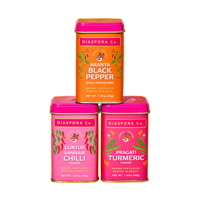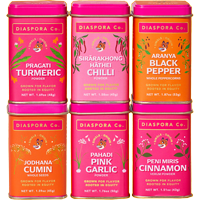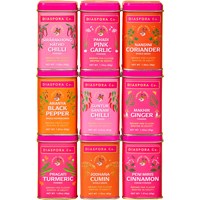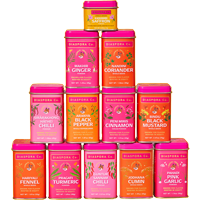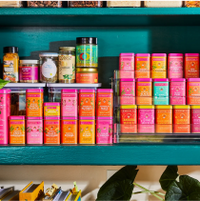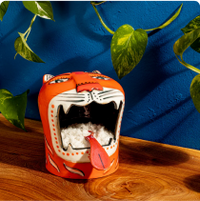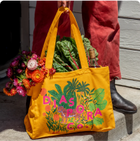1. What's decolonization got to do with it?
As a freshly minted member of the Indian diaspora in the United States, I found myself asking a lot of big questions as I encountered race, class, gender and social status on this foreign continent. Being a "person of color," "Asian-American," a part of the American art world, a cook in a racialized kitchen – none of these labels really fit, or truly translated my experience as a young woman raised in Mumbai, India in the 90s, trying to find her way in neoliberal America.
It wasn't until a college professor gave me the term post-colonialism, and led me in the direction of literature, art and research around the subject, did I feel like I had finally found the language that my identity most easily translated into.
Post-colonialism responds to the cultural legacy of colonialism and the structural extraction of resources, knowledge and capital through imperialism. It examines the lasting present day effects of colonial rule on the former colony.
I am a perfect product of the effects of colonization – from my education (in english, heavy on the Wordsworth), to the food I grew up eating (dal and digestive biscuits in equal measure) – I am post-colonial to my core. So what does decolonization look like for me, and my work?
SPICES.
The original intent of colonial conquest of the Indian subcontinent was a desire for domination of the spice trade. So as a postcolonial Indian woman at the crossroads of food and culture, the pieces just fell together – decolonization of food was putting power and resources into indigenous spice farming and creating a radically new and equitable vision of the spice trade, decolonization a commodity back into a seasonal crop, and a broken system into an equal exchange.
Think about how far companies such as Stumptown or Four Barrel Coffee or Dandelion Chocolate have come in a decade? Direct trade coffee and bean to bar cacao have changed the way two former colonial commodities – traditionally grown in the global South with a hefty side of exploitation and imperialism, for consumption by the global North — are bought, sold and perceived. The Global South is finally beginning to get the bare minimum of recognition it deserves for supplying the world's caffeine addiction and favorite dessert through systemic shifts of supply
As our diets evolve (2017 was the year of the international flexitarian) and our pantries grow to incorporate different cuisines into our weekly repertoire, our formerly dusty vials of spices, marked with faraway, colonized locales are in for a major upgrade. To me, direct trade, singe origin, heirloom spices from sustainable farms across the globe is decolonizing the oldest game around.
2. So where do the best spices come from?
Working in the heart of the "good food movement" in the Bay Area means being spoiled for choice. From citrus to wine to the incredible history of food and agriculture that immigrants have brought and refined here for generations now, we are so lucky. There is the concept of "celebrity farms" here in a way that would be laughable in the rest of the world.
Yet, when I asked local chefs, cooks and food writers where the best spices were coming from – the answers I got were paltry at best. Often, I would get a head nod of reassurance that these spices were "sourced from India", as though my Indian-ness, and their half hearted sourcing from my country of origin somehow made this an acceptable answer.
I began realizing that the American imagination around "Made in India" needed a serious reality check. To me, "Made in India" is more likely to signify fertilizer overuse, farmer suicide, and rampant worker abuse than it is colorful piles of freshly ground spices amidst fragrant marketplaces and lush fields of tropical organic produce. I set out to find better answers, thinking to myself that if nothing else, I could come back with a better stocked pantry.
3. The Myth of Allepey Turmeric
Kozhikode, or Calicut during the years of the British Raj, was the epicenter of the spice trade. Spices became the world's first globally traded luxury food product and by default one of the Empire's earliest branding and marketing projects. Malabar pepper, Allepey turmeric, Saigon cinnamon and Ceylon tea are not botanical varietals, but carefully created brands that used the colonial names of far away, "exotic" places to entice the domestic British consumer into purchasing a taste of the Empire and feeling at ease with it. In giving the subjects of the Crown the chance to literally put the taste of British conquest into their teacups and onto the Sunday roast, they were creating a powerful brand association between colonized places, colonial crops and the domestic comfort of consumption. A brand so powerful that it's legacy lives on in how we buy, sell and recognize spices across the globe today.
Allepey, or Alappuzha as it is now called, is a beautiful city on the Kerala backwaters, once referred to as the "Venice of the East' by Lord Curzon. It is also the namesake of what is considered some of the highest quality turmeric on the Western market. So obviously, I set out to find Allepey turmeric in Allepey
It took three visits to four different farms across Kerala, much car sickness, and too many leaky motel rooms to find out that Allepey turmeric is really just a blanket term for bright yellow turmeric. It is turmeric of unknown varietal, able to meet a certain shade card of color and measure of size, that therefore deems it superior. It has no guaranteed curcumin content (read as the good stuff), it is just a catchall term used for turmeric of a certain hue- kind of like calling a grocery store tomato the best of it's kind because it's the shiniest and reddest. Whilst we all know that the true magic of a tomato lies in a peak season summer heirloom. Allepey turmeric is the gold standard of the Indian spice export market, and it means absolutely nothing? Well damn.
4. The Real Deal
The Indian Institute of Spice Research is a sleepy research campus just north of Kozhikode, Kerala. Despite numerous phone calls, emails and whatsapps, I had failed to get any response from them. So I did what any curious young person would do, I got on a flight and just showed up. I was greeted by a cheery Dr. Prasath as though he'd been expecting me all along and spent the next two days learning more about turmeric cultivation than I'd ever hoped to. Dr. Prasath introduced me to the two turmeric cultivars that I've since become obsessed with- Pragati and Pratibha. These two strains of heirloom turmeric have a high curcumin content, a short growing season and have been labors of love of IISR for the past decade. To say they desperately needed a market would be an understatement. I asked Dr. Prasath to connect me with any farmers he knew that were growing these strains organically. More unanswered phone calls, emails and whatsapps later, I found myself on a tiny plane to Vijayawada, Andhra Pradesh, to meet Mr. Prabhu, a fourth generation farmer who had taken the initiative to buy IISR Pragati rhizomes, and was now earnestly looking for a buyer for his gorgeous product. After five months of looking, I'd found the best turmeric in the world, in a sleepy village in Andhra Pradesh, where nobody else cared to look.
5. Money Matters #radicaltransparency
The commodity market price for 1 kilogram of turmeric in India is about 35 cents. At the time of writing this, on Amazon, you can buy 1 kilogram of turmeric for about $35. That's a ridiculous 100x markup, on par with pharmaceuticals and movie theater popcorn.
Right off the bat, I was able to offer Mr. Prabhu $3.5 per kilogram of Pragati turmeric. Even converted into rupees, this seemed like the only fair price that compensated him for his initiative, his commitment to sustainable agriculture, and for growing some of the world's best turmeric. This import export game is rough, this small business game is rough. My life since March has been a series of spreadsheets and accounting that has put my high school Excel spreadsheet skills to their ultimate test. It's been the most overwhelming, challenging and rewarding game of figure-it-out-one-day-at-a-time I've ever played.
Most US spice wholesalers are able to sell their turmeric at about $5-8 per kilogram. The price of direct trade, sustainably farmed spices is significantly greater than that. As we grow, it's been important for me to recognize how to achieve balance. How to accept and let go of the fact that we will never be able to match those prices, because in choosing to pay our producer really well, we are choosing equity, over and over again.
6. The Big Dream
The big dream is to use this mould of radical transparency, direct trade and deep research to slowly source spices from across India, and maybe someday, the world. Working with farmers growing organic cardamom, cinnamon, cloves- slowly knowing that every ingredient in my morning chai in California, comes from a spectacular array of farmers across India? That's the feeling of warmth and community I'm aspiring towards.






